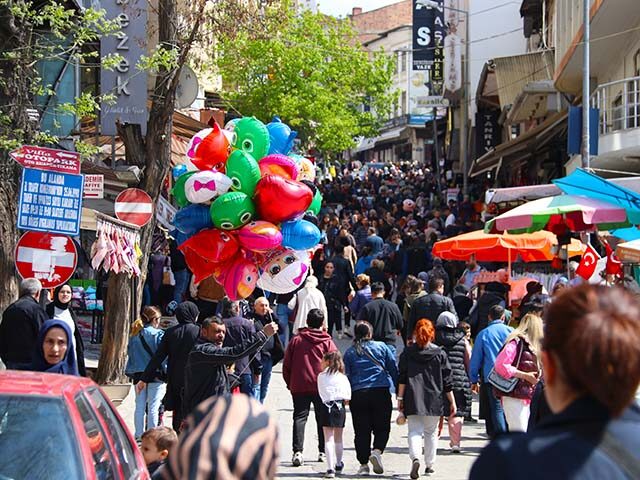Turkey Claims It Thwarted ISIS Bombing of Communist May Day March
 Nisanur Koc/Anadolu Agency via Getty Images
Nisanur Koc/Anadolu Agency via Getty Images
Authorities in Turkey have arrested more than 100 people in the past week accused of having ties to the Islamic State (ISIS) terrorist organization, including eight detained on Monday allegedly plotting a bomb attack on communist May Day marches in Istanbul.
Communists celebrate May Day, or International Workers' Day, annually on March 1, ostensibly to mark the contributors of global worker movements to society but more often to celebrate communist ideology, responsible for more than 100 million deaths around the world in its history. The celebrations planned in Turkey this year are not without controversy as the government of Islamist strongman Recep Tayyip Erdogan has banned the leftists from using Istanbul's iconic Taksim Square for their festivities, relegating them to smaller spaces.
Turkish Interior Minister Ali Yerlikaya published multiple messages on the social media outlet Twitter on Monday claiming that jihadist terrorists were planning to bomb attendees at May Day events. The dozens of arrests associated with the Islamic State – once the dominant terrorist threat on the globe – follow the bombing of a Roman Catholic church in Istanbul in January, the first Islamic State attack in Turkey since 2017. Relegated to plotting killings in South Asia and remote areas of Africa after the collapse of the “caliphate” in Syria and Iraq in 2017, terrorism experts have warned that the Islamic State is apparently making a comeback, recruiting with particular vigor in the Middle East and Central Asia.
In a message on Monday, Yerlikaya identified the top suspect arrested in the most recent operations against ISIS only by the initials “K.A.” and claimed that he was a terrorist associated with ISIS who had “knowledge of bombmaking.” K.A. was allegedly hoarding explosive chemicals in his home capable of causing “large-scale explosions,” the Turkish official said.
DEAŞ Terör Örgütüne yönelik düzenlenen “BOZDOĞAN-32” operasyonuyla DEAŞ silahlı terör örgütü ile bağlantılı olduğu ve bomba yapım konusunda bilgi sahibi olduğu tespit edilen; K.A. aynı işyerinde kalan M.H. ile birlikte İstanbul'un Beykoz ilçesinde yakalandı ❗
❌İstanbul İl… pic.twitter.com/Gf2dE6V5AS
— Ali Yerlikaya (@AliYerlikaya) April 29, 2024
The Middle Eastern news outlet Al Monitor, citing Turkish news sources, reported that K.A. was identified as a Syrian national and stood accused of planning to bomb May Day events in Istanbul.
“With Monday’s operation, the number of people caught over alleged ties to ISIS rose to 105 within a week,” Al Monitor observed. “There have been four separate operations since April 21 conducted in nearly 20 Turkish provinces … Over the past 10 months, Turkish authorities have caught more than 3,000 suspects in nearly 1,500 operations conducted against the suspected ISIS network in Turkey.”
In a summary of anti-terrorist activity published on Tuesday, Yerlikaya said that police had engaged in operations in 11 Turkish provinces: Istanbul, Diyarbakır, Adana, Antalya, Bilecik, Mardin, Batman, Muğla, Muş, Şanlıurfa, and Van. It is not clear if all provinces say police activity related to ISIS, as Yerlikaya identified some as being affiliated with “separatist” groups, possibly referring to the Marxist Kurdistan Workers' Party (PKK) terrorist group.
Some of the individuals, while not identified by name, were listed as propagandists, sharing pro-ISIS content on social media accounts rather than directly engaging in amassing weapons and building bombs. Yerlikaya repeated that many of those detained were allegedly planning attacks against May Day events.
“We will not tolerate any terrorists. With the superior efforts of our security forces, we will continue our fight with determination for the peace, unity and solidarity of our nation until the last terrorist is neutralized,” Yerlikaya declared.
1️⃣1️⃣ ilde sosyal medya üzerinden Bölücü Terör Örgütünün (BTÖ) propagandasını yapan, terör örgütü içerisinde faaliyette bulunduğuna dair bilgiler olan ve 1 Mayıs Emek ve Dayanışma Günü'nü provake etmeye yönelik hazırlık içerisinde bulunan şahıslara yönelik düzenlenen “BOZDOĞAN-33”… pic.twitter.com/eLYWCeH44n
— Ali Yerlikaya (@AliYerlikaya) April 30, 2024
Turkey is reportedly planning to deploy tens of thousands of police officers to Istanbul, one of the country's biggest left-wing strongholds, on Wednesday. International leftists expressed outrage with the Interior Ministry's decision to block assemblies within Taksim Square, which Yerlikaya declared “not convenient” for such events. Yerlikaya approved assemblies in 40 separate areas of the city rather than allowing one large congregation.
Amnesty International referred to the limitations as a “ban” and demanded Erdogan's government immediately rescind the decision.
“The ban on the May Day celebrations is based on entirely spurious security and public order grounds and goes against the recent Constitutional Court decision. It must be urgently lifted,” Amnesty International’s Deputy Regional Director for Europe, Dinushika Dissanayake said. “Taksim Square is a place of huge symbolic significance and has long been a place where people gather in protest and in celebration.”
While once accused of friendly ties to the Islamic State, Erdogan now falsely takes credit for eliminating the ISIS caliphate based in Raqqa, Syria. In reality, the Syrian Defense Forces (SDF), a Kurdish-led militia coalition, alongside the U.S. military liberated Raqqa and ended the terror state. Erdogan has increased his attention on the group after the bombing in Istanbul in January, the first in eight years.
Multiple reports suggest that the Islamic State is successfully strengthening itself in the Middle East.
“Just-released data from U.S. Central Command, which oversees U.S. forces across the Middle East and South Asia, puts the number of Islamic State fighters in Syria and Iraq at about 2,500 — more than double estimates from late January,” Voice of America reported in early April.
The Counter Extremism Project, an organization that tracks global terror activity, published a report in April concluding that “March was, by every metric, the most violent month of ISIS’s Badia [central Syrian desert] insurgency since late 2017, when the group first lost control of its territory.”
Follow Frances Martel on Facebook and Twitter.
Source link

